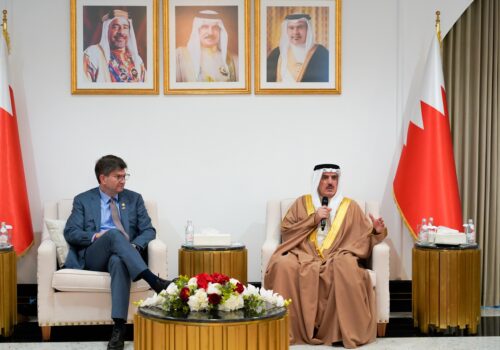What role do you think cyber operations play in modern conflicts, particularly in the complex landscape of the Israel-Iran conflict? As you consider the increasing reliance on technology, it’s essential to unravel how these digital strategies shape warfare today.

This image is property of www.atlanticcouncil.org.
The Evolution of Cyber Operations
In contemporary warfare, cyber operations have become an integral part of military strategy. These operations can range from low-level hacking to sophisticated attacks orchestrated by state actors. With the Israel-Iran conflict as a backdrop, you can see how cyber tactics are woven into the fabric of military engagements. Both countries have invested heavily in bolstering their cyber capabilities, leading to a digital battleground that complements traditional warfare. However, the effectiveness and implications of these cyber operations can often be overstated.
The Landscape of Cyber Capabilities
Advanced Cyber Warfare
When it comes to cyber capabilities, both Israel and Iran possess advanced technologies. Israel, for instance, is renowned for its cutting-edge surveillance technologies and cyber defense apparatus. Israel’s well-coordinated cyber unit, Unit 8200, has been instrumental in both defensive and offensive operations. You might find it interesting that Israel also exports these skills, working closely with allies to bolster their cyber defenses.
Iran, on the other hand, while relatively new to the cyber warfare game compared to Israel, has made substantial advancements. Iranian cyber groups, such as APT33 and APT34, have shown their capability to carry out sophisticated attacks, often in retaliation against perceived aggressors. While both countries are developing their cyber warfare strategies, that doesn’t always translate to impactful results on the ground.
The Nature of Cyber Activities in Conflict
While both nations engaged in cyber activities, the results were often limited. Cyber operations during the Israel-Iran conflict showcased a mixture of low-level hacktivism and high-level state-sponsored attacks. However, the actual impact of these operations was often minimal when viewed through the lens of traditional military metrics. When you dissect these activities, it’s clear that while they made headlines, they did not lead to significant shifts in the conflict’s dynamics.

This image is property of www.atlanticcouncil.org.
The Role of Hacktivism
Cyber Activism and Its Effects
During the conflict, various hacktivist groups made their presence felt. These groups often engaged in what could be classified as “digital graffiti,” where the acts were intended to make a statement rather than achieve tangible results. You might recall events where organizations took responsibility for defacing websites or leaking sensitive information. These acts served as a form of protest, showcasing the frustrations on both sides.
While hacktivism drew significant media attention, the reality is that its impact was primarily informational. Hacktivists were not dismantling operational capabilities but rather voicing dissent, often through acts that lacked strategic weight. This raises questions about the actual effectiveness of hacktivism in influencing the broader conflict.
The Limitations of Hacktivism
When analyzing the influence of hacktivism, it becomes evident that these actions often lead to more of a temporary disruption than a long-lasting effect. You might consider this akin to throwing a few pebbles into a pond; while ripples are created, they quickly dissipate. The limited operational impact of these activities calls into question their value in the grand scheme of warfare.
State-Sponsored Cyber Attacks
The Mechanics of Destructive Cyber Warfare
On a more serious scale, state-sponsored cyber attacks were a significant aspect of the Israel-Iran conflict. Attacks aimed at Iranian financial institutions, for instance, attempted to inflict damage and chaos. However, these attempts were often short-lived and provided more disarray than strategic advantage.
You might find it significant that, while the intent was to cripple the enemy, the actual outcome often fell short of creating a decisive change on the battlefield. Cyber warfare here acts more like a tactical tool rather than a strategic weapon.
Assessing the Impact
When assessing the overall impact of state-sponsored cyber attacks, it’s crucial to recognize that while they can create immediate chaos, their long-term military value is debatable. In many instances, these attacks did not achieve their desired effects of crippling infrastructure or making significant military gains. The question arises: are these operations worth the resources invested, or do they simply serve as temporary disruptions?

This image is property of www.atlanticcouncil.org.
Information Control Strategies
Internet Blackouts and Media Censorship
Both Israel and Iran leveraged information control strategies during the conflict. Internet blackouts were employed to disrupt communications and limit the flow of information. This approach aims to control narratives and prevent civilian access to news and updates. You may realize that while effective in the short term, these measures often lead to backlash and dissent.
Censorship and media manipulation were prominent tactics used to shape public perceptions. While these strategies succeeded in creating a narrative control environment, the effectiveness in altering the reality of military outcomes remains questionable. In many cases, such tactics simply delayed the inevitable disclosure of the truth rather than providing a substantive military advantage.
Short-Term Disruptions vs. Long-Term Gains
The primary outcome of information control tactics has been to create temporary disruptions in the information landscape. It’s essential to weigh these against the longer-term implications of such strategies. You might find it noteworthy that despite their ability to create chaos, the strategic rewards are often minimal.
Intelligence Gathering through Cyber Means
Spyware Operations
The conflict also saw the use of spyware, highlighting the intelligence-gathering efforts employed by both nations. You can consider the implications of such operations, which serve to collect crucial information that could turn the tide in conflict scenarios. While these operations can provide valuable intel, the questions remain: how effective are they in actual military operations?
Both nations have engaged in sophisticated espionage, utilizing cyber capabilities to infiltrate networks and gather intelligence. However, the operational impact of these efforts remains somewhat murky. You may wonder if these operations produce actionable insights that lead to significant military advantages or if they merely serve as a tool for future planning.
Evaluating the Outcomes of Intelligence Operations
In evaluating the outcomes of intelligence operations conducted through cyber means, it becomes clear that while they can enhance situational awareness, they don’t necessarily translate into decisive actions on the battlefield. The intelligence collected may inform strategy, but the actual execution of such strategies still relies on traditional military capabilities. This brings into focus the complexity of cyber operations and their actual utility within the framework of warfare.

This image is property of www.atlanticcouncil.org.
Conclusion: The Limits of Cyber Operations
The Israel-Iran conflict provides a case study for understanding the role of cyber operations in modern warfare. While both nations leveraged their advanced cyber capabilities, the overall impact was limited. Cyber activities, including hacktivism, state-sponsored attacks, and information control strategies, show how the digital landscape is intertwined with traditional combat.
You might note that the use of cyber operations serves to shape the information environment, but they do not offer a decisive advantage in the larger context of warfare. Effectiveness is often muddled by the nature of these operations, leading policymakers to recognize the incremental value of cyber capabilities rather than viewing them as a revolutionary force in conflict.
The Future of Cyber Operations
Looking ahead, future cyber operations will likely continue to target critical infrastructure and focus on intelligence-gathering efforts. It’s essential for decision-makers to maintain a realistic perspective on the potential and limitations of these capabilities. As conflicts continue to evolve, keeping a finger on the pulse of cyber operations will be vital in understanding their role in shaping modern warfare.
In a world where technology continues to intersect with conflict, staying informed and aware of these dynamics will be crucial. The digital and physical realms are now more connected than ever, and understanding this relationship will help navigate the complexities of future conflicts. As you consider these developments, take stock of the implications for military strategies and the role of cyber operations in shaping the conflicts of tomorrow.